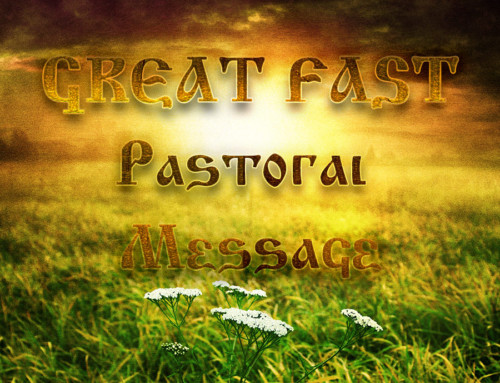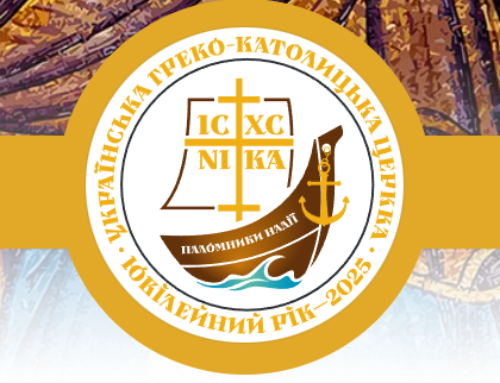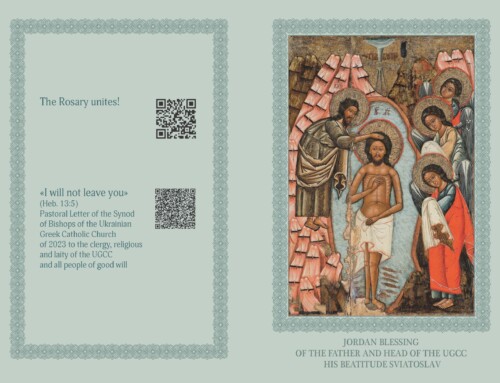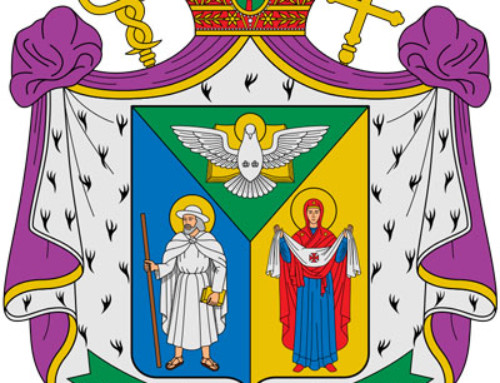CHRISTMAS PASTORAL LETTER OF HIS BEATITUDE SVIATOSLAV
Most Reverend Archbishops and Metropolitans, God-loving Bishops, Very Reverend Clergy, Venerable Monastics, Dearly Beloved Brothers and Sisters, in Ukraine and throughout the world
Glory to God in the highest, and on earth peace,
good will toward men (Lk 2:14)
Christ is born! Glorify Him!
Beloved in Christ!
Today we share with you a great joy that was first received and shared by nameless shepherds of Bethlehem, who outdoors in an open field watched over their flock in the middle of the night. As described by the evangelist Luke, when an angel of the Lord appeared to them, at first, they were filled with fear. But the angel spoke to them: “Fear not, for behold, I bring you good news of great joy that will be for all the people. For unto you is born this day in the city of David a Saviour, who is Christ the Lord” (Lk 2:10-11). And then, when the shepherds heard the angelic choirs sing, “Glory to God in the highest,” they said to one another: “Let us go over to Bethlehem and see this thing that has happened, which the Lord has made known to us” (Lk 2: 15). And they went, they found Mary and Joseph with the Child, and, having given them due reverence, went out and told others about Jesus.
The good news of Christmas is a feast of trust—not only of trust shared among us, human beings, but, above all, of God’s trust in humankind. We often speak of our faith in God, but rarely do we make note of God’s good will towards us, His faith and trust in us. The Lord entrusted the first good news about the birth of the Divine Child to simple shepherds, and then He shared the Good News of the Gospel with the myrrh-bearing women, with fishermen and tax-collectors—with simple and largely unknown people.
In Christ’s Nativity, the Heavenly Father entrusts His Only-begotten Son to humanity, and God becomes man! The angelic choir proclaiming “peace on earth to men of good will” speaks to the fact that God sees man as worthy of his trust and favour, preference and good will (which is how we literally translate the Greek term, eudokia). He sees us as good and believes in us. He sees us not only as we are today, with all our weaknesses and sinfulness, our poverty and perplexity. The Son of God sees in us His Image. In His incarnation, He takes on our human nature and teaches us to see Him, the Saviour of the world, in a small child. Seeing us as people of His good will, He sees us as those who we can become by the power of His grace just as loving parents see in their child a talented future writer or artist, a good mother or tender and responsible father, the leader of a people or their mighty protector.
In this Christmas mystery, the figure of the Theotokos personifies the trust that we humans should foster towards our Creator and Saviour, in response to God’s trust in us. The Mother of God, who holds in her arms the tiny Jesus in a cold stable, teaches us that we can and must trust God and our neighbour, since the Lord loved us first and entrusted Himself to us. In receiving the word of the archangel, she gives God space in her own body, gives Him her humanity—her human nature. Then St. Joseph, the guardian of Jesus and His Mother, having learned that Mary is pregnant, at first thinks of quietly releasing her. But, when the angel of the Lord appeared to him in a dream and said: “Joseph, son of David, do not fear to take Mary as your wife, for that which is conceived in her is from the Holy Spirit” (Mt 1:20), he believed, entrusted himself to God, and did everything as the angel commanded, justifying the Lord’s trust in him.
We live in a world where trust is not merely wounded, but under constant attack. A great crisis of trust is felt in different spheres of social and even church life. Through new communication technologies, the manipulation of truth, which has always existed throughout human history, today is carried with lightning speed all over the globe. We no longer know what to believe and whom to trust. Our understanding is permeated with the conviction that in the world there is no truth and no justice, and that at every step there is only deception, falsehood, and duplicity.
This dramatic situation is illustrated in the icon of the Nativity. The evil spirit, depicted in the form of an elderly man dressed in sheepskin, tempts Joseph, seeking to give rise to doubt in him regarding the Child and His Mother. This should surprise no one, for the devil, as the father of lies (see Jn 8:44) at every step seeks to sow mistrust and doubt regarding God’s good will towards us, and fosters interpersonal conflict at all levels, in personal, family, and community life.
The current pandemic has further increased this crisis of trust. Given that the virus hides inside a person, the other for me becomes a potential source of illness, and even death. This introduces into human relations elements of suspicion, fear, and escape.
Our attitude towards social and government institutions is also marked by mistrust. Various conspiracy allegations regarding the safety of the coronavirus vaccine augment a mistrust of authority, that is already prevalent in our society, and bring out in our fellow citizens even greater confusion and fear for the future. People don’t believe the government and other institutions called to care for the common good and for social health services, as is their responsibility. Possibly, because of the history of the 20th century, post-Soviet societies have a greater tendency, than do other parts of the world, to disbelieve government institutions, and thus easily become susceptible to all sorts of manipulation and propaganda. Similarly, in the politically polarized countries of the Western world, the spreading of fear and mistrust is also utilized as an instrument of political warfare. However, it is important to remember that when we adopt a principle of “I don’t believe anyone,” we always play into someone else’s hands, someone exploits our disappointment for their own purposes. Mistrust destroys human relations at all levels. Mistrust destroys the family, society, a people, and nation!
In response to our present-day temptations regarding mistrust, the Lord Himself comes in order to reveal the truth and embrace us with His trust. On the vigil of the Nativity, we sing: “You have shone forth from a Virgin, O Christ, rational Sun of Righteousness. And a star showed You, Whom nothing can contain, contained in a cave. You led Magi to worship You and along with them we magnify You: Glory to You, O Giver of Life” (Vespers Troparion). To celebrate Christ’s Nativity is to trust the Divine Child who conquers death and, by accepting human life, brings the gift of His Divine Life. Christmas is not some devotional tale but a unique event in history, which bears witness to the Lord’s trust in humankind. God believes in His creation. He believes in us more than we believe in ourselves.
Through faith in God, in His birth among us, let us restore our trust in a humanity that searches for Him! Let us be people of God’s favour and let us learn to place our favour in others—to see in them their good characteristics, gifts and talents, abilities, and elevated spirit. Although today the circumstances of a spreading virus at times require us to cover with protective masks our mouths and nostrils, but in God’s name, let us not close off our hearts to others! Let others see joy, love, and goodness in our eyes! Indeed, in the midst of the challenges and trials of the pandemic, let us be heralds of Divine good will.
My wish is that, following the example of the Holy Family, our families be a place of mutual respect, love, and trust. I especially ask you, beloved parents, to foster a spirit of trust in your children, so that, when they encounter the challenges of this world, they know that they can always count both on you and on our Lord God, who entrusted them into your care. At various stages of your children’s growth, cultivate and build trust and mutual respect in joy, love, and patience. Be for them their first teachers of profound faith, an example of fervent prayer, encourage them to serve their neighbour at an early age. Give the greatest of attention to the time of transition from childhood to youth, take care that your children know how to distinguish between the false and the authentic, between divine truth and diabolical falsehood. May your offspring know that not only you believe in them and are able to see their future in realized talents and divine gifts, developed in their souls, but that our Lord God Himself believes in them and calls on them to do His good works in the world.
And so, let us celebrate Christmas together! Wherever we may be, through mutual trust let us create today our own Bethlehem! Those who celebrate in their family circle—with sincere joy. Those who are compelled to be far from your loved ones—with a sense of spiritual unity. Those who are able to come to church—with a profound experience of the feast’s solemnity and with love for Christ who gives Himself to us as spiritual food as a sign that He believes in us. Those who participate in divine services online—with a blessed longing for our brothers and sisters in Christ. Let each of us share our Christmas joy with one another—any way we can! And may the traditional Ukrainian carol resound throughout.
Dear brothers and sisters! This festive day I express to you my trust and faith, that you yourselves intuitively sense how to properly greet the newborn Saviour, and know how to share the joy of this encounter with those at your side. With Christ’s Nativity, I warmly greet you all: from East to West, from North to South—in Ukraine and abroad, on all the continents of the world. In a special way, I unite myself to those who are sad or feel lonely, to all who labour far from home and precisely in this moment experience the absence of their loved ones and miss the warmth of the family home. I express my condolences to those families for whom this year it is painful to sit at Christmas Eve supper, when at the table there is an empty seat, not long ago occupied by a father or mother, husband or wife, brother or sister, son or daughter. With tearful eyes be joyful in the faith that today your loved ones are celebrating in heaven. I share my Christmas joy with our elderly—grandmothers and grandfathers, and also with the needy. I sincerely greet our soldiers on the front line—our pride. My thoughts fly to our prisoners of war and those held captive: in conveying my Christmas greeting I encourage you to not lose spirit, for our Lord God Himself believes in you. I greet our children and youth—our future, and wish that today your smile not leave your face, and that your joy be full.
From the bottom of my heart, I wish all of you the authentic joy of the children of God, a tasty kutia, a cheerful celebration of Christ’s Nativity, and a happy, peaceful, and blessed New Year!
Christ is born! Glorify Him!
† SVIATOSLAV
Given in Kyivat the Patriarchal Cathedral of the Resurrection of Christ, on the day of the all-praiseworthy Apostle Andrew the First-called the 13th of December (30th of November) in the 2021st Year of our Lord
РІЗДВЯНЕ ПОСЛАННЯ БЛАЖЕННІШОГО СВЯТОСЛАВА
Високопреосвященним архиєпископам і митрополитам, боголюбивим єпископам, всечесному духовенству, преподобному монашеству, возлюбленим братам і сестрам, в Україні та на поселеннях у світі сущим
Слава на висотах Богу й на землі мир людям Його вподобання! (Лк. 2, 14).
Христос народився! Славімо Його!
Дорогі в Христі!
Сьогодні ділимося з вами великою радістю, яку вперше прийняли і нею поділилися невідомі вифлеємські пастушки, котрі перебували на відкритому полі та вночі чували біля свого стада. За розповіддю євангелиста Луки, коли ангел Господній з’явився, то їх спершу огорнув великий страх. Та ангел до них промовив: «Не бійтесь, бо я звіщаю вам велику радість, що буде радістю всього народу: Сьогодні народився вам у місті Давидовім Спаситель, він же Христос Господь» (Лк. 2, 10-11). Відтак, почувши похвальний спів ангельських хорів «Слава на висотах Богу», пастушки один одному сказали: «Ходім лишень до Вифлеєму та подивімся на ту подію, що Господь об’явив нам» (Лк. 2, 15). І пішли, знайшли Марію і Йосифа з Дитятком та, поклонившись їм, пішли і розповіли іншим про Ісуса.
Різдвяна благовість – це свято довіри, – довіри не тільки між людьми, а передусім Бога до людини! Ми часто говоримо про нашу віру в Бога, а мало коли звертаємо увагу на Боже вподобання стосовно нас, Його віру та довіру до нас. Господь довірив першу добру новину про народження Божого Дитяти звичайним пастухам, а згодом поділився своєю євангельською благовістю із жінками-мироносицями, рибалками, митниками – простими і мало кому відомими людьми.
У Різдві Христовому Небесний Отець довіряє людям свого єдинородного Сина і Бог стає людиною! Ангельський спів про «мир на землі людям Його вподобання» вказує на те, що Бог бачить людину гідною Його довіри і вподобання, прихильності і благовоління (саме так дослівно перекладається грецьке поняття «євдокія»). Він бачить нас добрими і вірить у нас. Він бачить нас не тільки такими, яким ми є сьогодні, серед усіх наших немочей і гріховності, нашої біди і розгубленості. Син Божий бачить у нас Свій Образ, а воплочуючись, приймає нашу людську природу і в маленькому дитятку вчить нас бачити Його самого, Спасителя світу. Споглядаючи нас як людей свого благовоління, Він бачить нас такими, якими ми можемо стати за допомогою сили Його благодаті, подібно як люблячі батьки бачать у своїй дитині майбутнього талановитого письменника чи художника, добру матір чи ніжного і відповідального батька, провідника народу чи його могутнього захисника.
Постать Богородиці в цьому різдвяному таїнстві уособлює те довір’я, яке людина повинна плекати до свого Творця і Спасителя у відповідь на Божу довіру до нас. Мати Божа, яка в холодній стаєнці тримає на руках маленького Ісуса, вчить нас, що ми можемо і повинні довіряти Богові та ближньому, бо сам Господь першим полюбив нас і довірився нам. Приймаючи слово архангела, Вона дає Богові простір у власному тілі, дає Йому свою людяність – людську природу. Відтак св. Йосиф, опікун Ісуса та Його Матері, дізнавшись, що Марія вагітна, спершу думає потайки Її відпустити. Та, коли ангел Господній з’явився йому вві сні і сказав: «Йосифе, сину Давида, не бійсь узяти Марію, твою жінку, бо те, що в Ній зачалось, походить від Святого Духа» (Мт. 1, 20), чоловік повірив, довірився Богові і зробив усе за велінням ангела, оправдавши Господню довіру до нього.
Ми живемо у світі, де довір’я не тільки зранене, а й перебуває під постійною атакою. Велика криза довіри відчутна в різних сферах суспільного і навіть церковного життя. За посередництвом нових комунікаційних технологій маніпуляція правдою, яка існувала в людській історії завжди, сьогодні несеться з блискавичною швидкістю по всій земній кулі. Ми вже не знаємо, у що вірити і кому довіряти. У нашій свідомості утверджується переконання, що нема на світі ні правди, ні справедливості, що на кожному кроці тільки обман, брехня і крутійство.
Ця драматична ситуація зображена на іконі Різдва Христового. Злий дух у вигляді старшого чоловіка у волосяниці спокушає Йосифа, намагаючись викликати в нього сумнів щодо Дитяти та Його Матері. Нема чого цьому дивуватись, адже диявол, як батько брехні (пор. Ів. 8, 44), на кожному кроці старається посіяти підозри і сумнів про Боже до нас благовоління та сприяє конфліктам між людьми на всіх рівнях, у приватному, родинному та громадському житті.
Сучасна пандемія ще більше посилила кризу довіри. Оскільки вірус ховається в людині, то інша особа є для мене потенційним джерелом захворювання і навіть смерті. Це впроваджує в людські стосунки елементи підозри, страху і втечі.
Недовірою позначене рівно ж наше ставлення до суспільних і державних інституцій. Різні конспіративні чутки щодо небезпеки вакцин проти коронавірусу накладаються на загальнопоширену в нашому суспільстві недовірливість до влади і викликають у душах наших співвітчизників ще більше замішання і тривогу за майбутнє. Люди не вірять владі та іншим інституціям, які покликані дбати про загальне благо і громадське здоров’я та нести за це відповідальність. Можливо, з огляду на історію ХХ століття, пострадянські країни мають більшу, ніж це може бути в інших частинах світу, схильність не довіряти державним інституціям, тому легко стають жертвами різного роду маніпуляцій і пропаганди. Зрештою, у політично поляризованих країнах західного світу сíяння страху і недовіри теж стає інструментом політичної боротьби. Проте слід пам’ятати, що, керуючись принципом «не вірю нікому», ми завжди граємо комусь на руку, хтось використовує наше розчарування для досягнення власних цілей. Недовіра руйнує людські стосунки в усіх сферах. Недовіра руйнує родину, громаду, народ і державу!
У відповідь на ці наші сучасні спокуси недовіри сам Господь приходить, щоб об’явити правду і обгорнути нас своєю довірою. У навечір’я Різдва Христового ми співаємо: «Засяяв Ти, Христе, з Діви, як духовне Сонце Правди, і зоря появила Тебе невидимого, що вмістився у вертепі. І мудреців привів Ти, щоб поклонилися Тобі; з ними й ми Тебе величаємо: Життєдавче, слава Тобі!» (Тропар Вечірні). Святкувати Різдво Христове – це довіряти Божому Дитяті, яке долає смерть і, приймаючи людське життя, несе в дарі своє Боже Життя. Різдво – це не якась побожна казка, а унікальна в історії подія, що свідчить про Господнє довір’я до людини. Бог вірить у своє створіння. Він вірить у нас більше, ніж ми віримо самі в себе.
Через віру в Бога, у Його народження між нами, відродімо довір’я до людини, яка Його шукає! Будьмо людьми Божого вподобання і вчімося вкладати своє вподобання в іншу людину – побачити в ній добрі риси, дари і таланти, вміння і висоту духу. Хоч обставини поширення сучасного вірусу деколи вимагають, щоб ми прикривали захисними масками наші вуста та ніздрі, але, в ім’я Боже, не закриваймо своїх сердець перед іншими людьми! Даймо їм побачити радість, любов і доброту в наших очах! Саме серед викликів і випробувань пандемії будьмо носіями Божого благовоління!
Бажаю, щоб наші сім’ї були, на зразок Пресвятої родини, місцем взаємної пошани, любові та довіри. Особливо прошу вас, дорогі батьки, плекати духа довір’я у своїх дітей, щоб, коли їх спіткають виклики цього світу, вони знали, що можуть завжди покладатися як на вас, так і на Господа Бога, який доручив їх вашій опіці. На різних етапах зростання дітей бережіть і будуйте довіру та взаємоповагу в радості, любові й терпеливості. Будьте для них першими вчителями глибокої віри, прикладом щирої молитви, заохочуйте їх змалечку до служіння ближньому. Найпильнішу увагу звертайте на перехідний час від дитинства до молодості, подбайте, щоб діти вміли відрізнити фальшиве від автентичного, Божу правду від диявольської брехні. Хай ваші нащадки знають, що не тільки ви в них вірите і здатні бачити їхнє майбутнє в реалізованих талантах і розквітлих у їхній душі Божих дарах, а що сам Господь Бог у них вірить і кличе їх до творення Його добрих діл у світі.
Отож святкуймо Різдво разом! Хоч би де ми були, творімо взаємною довірою наш сучасний Вифлеєм! Хто святкує в сімейному колі — то зі щирою радістю; хто змушений бути далеко від рідних — то з відчуттям духовної єдності; хто може прийти до храму — то з переживанням святої урочистості празника та в любові до Христа, який дає себе нам як духовну поживу на знак, що Він вірить у нас; хто бере участь у святкових богослужіннях онлайн — то в благословенній тузі за братами і сестрами в Христі. Ділімося одне з одним різдвяною радістю — хто як може! Хай скрізь лунає традиційна українська коляда!
Дорогі брати і сестри! Цього святкового дня висловлюю вам своє довір’я і вірю, що ви самі відчуваєте, як гідно зустрічати новонародженого Спаса, і вмієте ділитися радістю цієї зустрічі з кожним, хто є поруч із вами. Із Різдвом Христовим сердечно вітаю вас усіх: від сходу до заходу, від півночі до півдня — в Україні і на поселеннях, на всіх континентах світу. Особливим чином єднаюся з тими, хто сумує чи почувається самотнім, з усіма, хто на заробітках далеко від дому і саме цієї миті відчуває брак рідних і тепла родинної оселі. Співчуваю тим родинам, яким цього року тяжко сідати до Святої вечері, бо при столі стоїть порожнє крісло, котре ще недавно було місцем тата чи мами, чоловіка чи дружини, брата чи сестри, сина чи доні. Крізь сльози радійте з вірою, що сьогодні ваші найдорожчі святкують у небі. Ділюся різдвяною радістю з нашими старшими — бабусями і дідусями, а також з усіма потребуючими. Щиро вітаю наших військових на фронті — нашу гордість. Лину думкою до полонених і ув’язнених: переказуючи різдвяні вітання, заохочую вас не занепадати духом, бо у вас вірить сам Господь Бог. Вітаю дітей і молодь — наше майбутнє, і бажаю вам, щоб сьогодні усмішка не сходила з ваших уст, щоб ваша радість була повна.
Від щирого серця бажаю всім вам справжньої радості дітей Божих, смачної куті, веселих свят Різдва Христового та щасливого, мирного і благословенного нового року!
Христос народився! Славімо Його!
† СВЯТОСЛАВ
Дано в Києві, при Патріаршому соборі Воскресіння Христового, у день Святого всехвального апостола Андрія Первозванного,
13 грудня (30 листопада) 2021 року Божого




